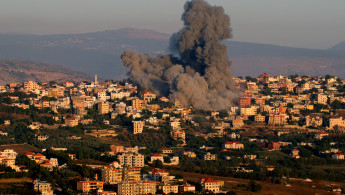Foreign nationals told to leave Lebanon as war fears surge
Urgent calls grew for foreign nationals to leave Lebanon, which would be on the front line of a regional war, as Iran and its allies readied their response to high-profile killings blamed on Israel.
While diplomats worked to avert a feared conflagration, France's Emmanuel Macron and Jordan's King Abdullah II said on Sunday a regional military escalation must be avoided "at all costs", the French presidency said after they held a telephone call.
With major military action from Lebanon's Iran-backed Hezbollah movement and others widely expected, Israeli Defence Minister Yoav Gallant said: "If they dare to attack us, they will pay a heavy price."
In the deadliest incident on Sunday in Gaza, the Civil Defence agency said an Israeli strike hit two Gaza City schools housing displaced people, killing at least 30.
This brings to at least 11 the number of schools hit in Gaza since 6 July.
Israel's army confirmed the latest strike, saying Hamas was using the schools.
Near the Israeli commercial hub of Tel Aviv, medics and police said two people were killed in a stabbing attack.
The suspect, a Palestinian from the Israeli-occupied West Bank, was "neutralised" by police and taken to hospital, where he was pronounced dead.
'Highly volatile'
Hezbollah, which has traded near-daily fire with Israeli forces since the war on Gaza broke out in October, announced the deaths of two of its fighters without specifying where.
The Lebanese health ministry said an Israeli strike on the southern border village of Hula killed two people.
Lebanon's official National News Agency had reported Israeli strikes on various areas of south Lebanon after Hezbollah said it had fired a fresh barrage of rockets at northern Israel.
The Israeli military said most of the 30 projectiles launched from Lebanon were intercepted.
Sirens sounded again early Monday in northern Israel's Upper Galilee region after "numerous suspicious aerial targets were identified crossing from Lebanon", the Israeli military said.
The attack triggered a fire, and an officer and a soldier were "moderately injured", it said on Telegram.
The cross-border violence since October has killed some 547 people in Lebanon, primarily fighters but also including 115 civilians, according to an AFP tally.
Saudi Arabia, France and Kenya became the latest of several countries calling on their citizens to leave Lebanon.
Kenya’s foreign ministry appealed to its citizens in Lebanon to register for evacuation in a statement on Tuesday.
The ministry also urged those who can move to safer areas within Lebanon or leave the country to do so.
France also issued a similar call, in a statement by its foreign ministry which "urgently asked" its nationals to avoid travelling to Lebanon and suggested those already in the country leave "as soon as possible".
France also urged its nationals living in Iran to "temporarily leave", but did not issue similar calls for citizens in Israel.
Turkey urged its citizens in Lebanon to leave the country if they do not need to stay, due to the possibility that the security situation there will deteriorate rapidly, its foreign ministry said late on Sunday.
The Japanese Foreign Ministry also issued a travel alert on Monday urging Japanese citizens in Lebanon to evacuate the country due to rising tensions in the Middle East.
Several Western airlines have suspended flights to Lebanon and other airports in the region.
Qatar Airways said the Doha-Beirut route would "operate exclusively during daylight hours" at least until Monday.
On Monday, the World Health Organisation delivered 32 tons of medical supplies to Lebanon's health ministry, including at least 1,000 trauma kits to treat possible war wounded.
"The goal is to get these supplies and medicines to various hospitals and to the health sector in Lebanon, especially in the places most exposed (to hostilities) so that we can be ready to deal with any emergency," Health Minister Firass Abiad told reporters at the airport landing strip where the aid arrived.

![Emboldened by a far-right Israeli government, settlers have impeded the delivery of aid into Gaza [Getty]](https://www.newarab.com/sites/default/files/styles/image_345x195/public/2024-06/GettyImages-1964596571.jpg?h=790be497&itok=qnvUb1hy)



 Follow the Middle East's top stories in English at The New Arab on Google News
Follow the Middle East's top stories in English at The New Arab on Google News

![A group of Palestinians, foreign and Israeli activists gather to participated in an olive picking event on the land in the town of Battir, which is under threat of confiscation by Israel in Bethlehem, occupied West Bank on 8 November 2024. [Getty]](/sites/default/files/styles/image_330x185/public/2182930803.jpeg?h=199d8c1f&itok=__0LgGsa)
